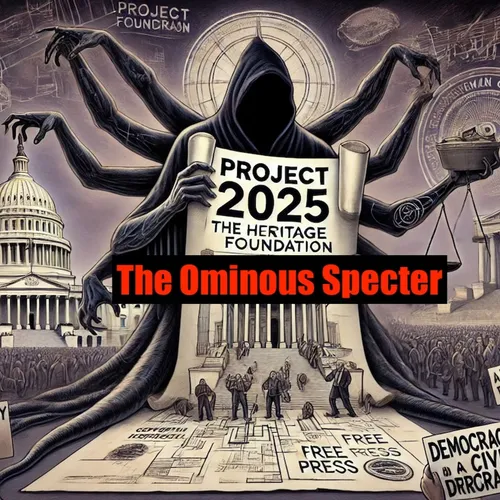Radical Overhaul: How Project 2025 Aims to Reshape American Governance
- Author
- Quiet.Please
- Published
- Tue 17 Dec 2024
- Episode Link
- https://www.spreaker.com/episode/radical-overhaul-how-project-2025-aims-to-reshape-american-governance--63359610
As I delve into the intricacies of Project 2025, a comprehensive policy initiative crafted by the Heritage Foundation, it becomes clear that this is more than just a blueprint for the next Republican president; it is a vision for a radical overhaul of American governance.
Project 2025, unveiled in April 2022, is the culmination of efforts by over 400 scholars and experts, many of whom have ties to the Trump administration. The project is led by figures like Paul Dans, former chief of staff at the Office of Personnel Management, and Spencer Chretien, a former special assistant to President Trump. Despite Trump's attempts to distance himself from the project, its authors and contributors are undeniably aligned with his policy agenda[1][4][5].
At its core, Project 2025 is structured around four key pillars: a detailed policy guide, a database of potential personnel for the next administration, a training program dubbed the "Presidential Administration Academy," and a playbook outlining actions to be taken within the first 180 days in office. This multi-pronged approach is designed to ensure a seamless transition and rapid implementation of conservative policies[1][4].
One of the most striking aspects of Project 2025 is its sweeping proposals for federal agencies. The Department of Homeland Security, for instance, is slated for dismantling, with its components either merged with other agencies or reorganized into a standalone, Cabinet-level border and immigration agency. This new entity would be staffed by over 100,000 employees, reflecting a significant shift in immigration enforcement and border control[1][2].
The Department of Education is another target, with Project 2025 advocating for its abolition and the transfer or termination of its programs. This move aligns with long-standing Republican calls for reduced federal intervention in education and increased support for school choice. The National Institutes of Health (NIH) would also see significant changes, including a reduction in its independence and a halt to funding research involving embryonic stem cells[2].
Environmental and climate change policies are also in the crosshairs. The project recommends relaxing regulations on the fossil fuel industry, repealing the Inflation Reduction Act, and closing various clean energy initiatives within the Department of Energy. Diana Furchtgott-Roth, the Heritage Foundation's energy and climate director, has suggested that the EPA should support increased consumption of natural gas, despite concerns from climatologists about the potential increase in methane leaks[2].
The Consumer Financial Protection Bureau (CFPB) and the Federal Trade Commission (FTC) are also on the chopping block. Project 2025 proposes abolishing the CFPB and significantly reducing the role of the FTC, which is responsible for enforcing antitrust laws. This would mark a substantial retreat from consumer and market protections, reflecting a broader theme of reducing regulatory oversight in favor of industry interests[1][2].
In the realm of social issues, Project 2025 takes a hardline stance. The agenda calls for the FDA to reverse its approval of the abortion pill mifepristone and to reinstate more stringent rules for its use. It also seeks to eliminate coverage of emergency contraception and to use the Comstock Act to prosecute those who send and receive contraceptives and abortion pills. These proposals are part of a broader effort to explicitly reject abortion as healthcare[1][2].
The project's vision extends to the economy as well, with recommendations for tax cuts and work requirements for able-bodied, childless adults on food stamps. It also proposes changes to overtime rules that could weaken protections and decrease overtime pay for some workers. The Bureau of Economic Analysis, the Census Bureau, and the Bureau of Labor Statistics would be merged into a single...
